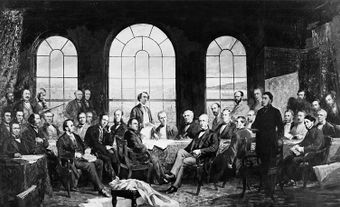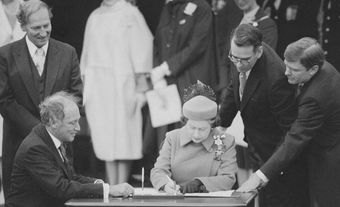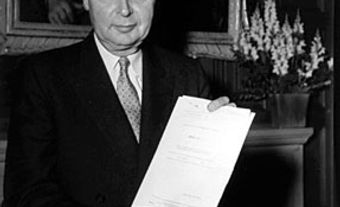
Representative government is a political system in which an elected assembly governs. Members of the assembly act as the people's representatives in government. Canada's provinces and territories obtained representative government in different ways and at different times.
Colonial Government
Colonies settled by Britain have a long tradition of representative government. These colonies accepted that they should only be governed and taxed either by the British Parliament or a colonial elected assembly. In colonies conquered by Britain from other nations, the British Crown might legislate as it pleased; however, once colonies were promised or granted an assembly, that privilege could be taken away only by the Parliament in London.
Atlantic Canada
Colonies in what is now Canada were granted assemblies in a number of different ways, and every assembly had different powers. Nova Scotia was the first British North American colony to be granted representative government — its assembly opened on 2 October 1758. Prince Edward Island would see its first elected assembly open in 1773, four years after separating from Nova Scotia. In 1784, following the influx of Loyalists, New Brunswick was separated from Nova Scotia and given representative institutions of its own. In 1832, after considerable debate in Britain, the governor of the colony of Newfoundland was instructed to summon an assembly.
Ontario and Québec
In Ontario and Québec, today's representative institutions rest on statutes. The colony of New France, after being conquered by the British in 1763, was promised representative government. However, when the British Parliament passed the Québec Act of 1774, the colony came under the rule of a governor and an unelected council. A second British statute, the Constitutional Act of 1791, split the colony into Upper and Lower Canada, each with an elected representative assembly. A third statute, the Act of Union of 1840 (proclaimed in 1841), reunited the two Canadas and established their parliament. A fourth statute, the British North America Act of 1867, created Québec and Ontario and laid the foundation of their present provincial assemblies.
Western Canada
The British colony of Vancouver Island had an assembly from 1856 to 1858. However, British Columbia's modern legislative system evolved from a different representative assembly, granted to the newly-formed colony of British Columbia in 1866.
Representative government arrived later in the Prairie provinces and the northern territories. In 1870 the Canadian Parliament in Ottawa created Manitoba out of former Hudson's Bay Company lands, granting it a representative assembly. When the validity of the Manitoba Act was questioned, the British Parliament the following year empowered Ottawa to create provinces out of the same lands. The old North-West Territories (then centered in what is now Alberta and Saskatchewan) received a fully elective assembly in 1886 by federal statute (see North-West Territories Act). Not until 1905 were the separate provinces of Alberta and Saskatchewan created within Confederation, each with their own elected assemblies.
Parliament established the Yukon Territory in 1898 and made its territorial council fully elective in 1908. The Northwest Territories council, created in 1905, became partly elective in 1951 and fully elective in 1974. Nunavut received its own elected assembly when that territory was created out of the eastern half of the Northwest Territories in 1999. If history is a guide, these territorial councils are the forerunners of provincial assemblies. The conversion of representative into responsible government occurred over varying periods of time as circumstances permitted or dictated in a particular province.
(See also Provincial Government, Territorial Government, Nunavut and Confederation, Northwest Territories and Confederation, Yukon and Confederation, British Columbia and Confederation, Alberta and Confederation, Saskatchewan and Confederation, Manitoba and Confederation.)

 Share on Facebook
Share on Facebook Share on X
Share on X Share by Email
Share by Email Share on Google Classroom
Share on Google Classroom



